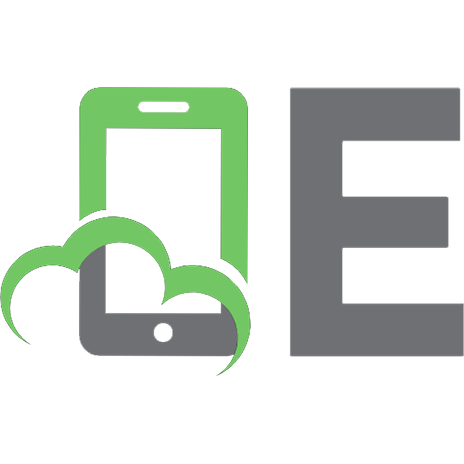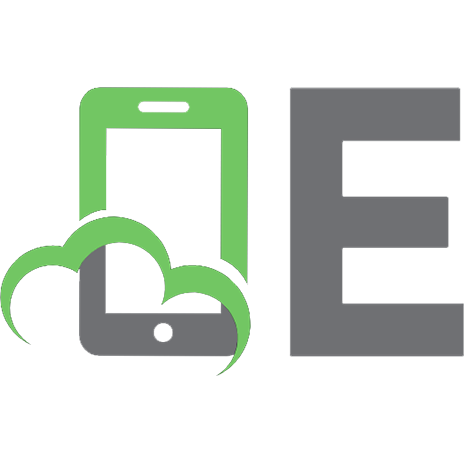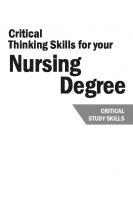Study Skills Connected: Using Technology to Support Your Studies [2012 ed.] 113701945X, 9781137019455
Engaging, accessible and practical, this book helps students to get the most out of new technologies to enhance their le
164 100 8MB
English Pages 204 [203] Year 2012
Table of contents :
Cover
Contents
Acknowledgements
Abbreviations
Introduction
Who is the book for?
What is this book about?
Chapter outlines
The approach taken by the book
How to use the book
1 Studying with new technologies
Self-evaluation: identify your priorities
Using new technologies at college or uni
Being part of an online learning community
Basic netiquette
Netiquette: managing your tone
Netiquette in academic and work contexts
Self- evaluation: netiquette
Your netiquette and ground rules
Your online presence
Protect yourself and others
Taking care of your privacy and security
Taking care of your privacy and security
Respect for others' online material
Plagiarism and cheating
Using new technologies as a student
Using new technologies as a student
What equipment do I need?
Identifying resource requirements
Developing the right academic skills
Identifying your academic skills needs
Basic IT skills
Summary
2 Virtual learning environments
What is a virtual learning environment (VLE)?
How are VLEs used to support learning?
How are VLEs used to support learning?
Using the VLE: interaction and discussion
Using the VLE: resources and assessment
Using the VLE: collaboration and links
Using the VLE: course information and administration
Case study: a student's use of the VLE
Online assessment practice
Making effective use of online feedback
Using discussion boards for study
Using discussion boards for assignments
Case study: discussion board thread
Case study: discussion board thread
Summary
3 Managing online information for academic study
Self- evaluation: what would be useful to me?
Stages in managing information for study
Finding suitable material for your assignments
Locations for finding academic material online
Using the Internet for academic purposes
Narrowing or extending your online search
The impact of your search strategy
Developing your search strategy
Bibliographic databases
Digital repositories
Saving, retrieving, sharing and using information
Using Google tools for study
Online tools for study: group presentations
Online tools for study: written group report
Case study: conducting literature searches for projects
Evaluating material on YouTube for study
Using YouTube for study
Making YouTube videos for assignments
Summary
4 Podcasts
What are podcasts?
Finding and subscribing to podcasts
Evaluating quality for academic purposes
Selecting podcasts for academic use
Podcasts made specially for your course
Organisational skills for using podcasts
Making notes when using podcasts
Applying critical thinking to podcasts
Referencing podcasts in your work
Using podcasts for exam preparation and recall
How helpful are podcasts?
Good podcast design
Producing your own podcasts
Summary
5 Blogs
What is a blog?
What students say about blogs
Reasons for creating a blog
Reasons for creating a blog
Creating a blog
Creating a blog
PageHd Blog design: what works?
Good blog design
Writing blogs for an audience
Sharing and publicising your blog
Comments in blogs
Constructive commenting
Creating blogs for academic assignments
Using blogs for academic reflection
Blogs to support project development
Blogs to support professional development
Checklist: creating blogs for academic study
Case study: blog to support a student project
Case study: work placement blog
Using other people's blogs for academic study
Applying critical thinking to blogs
Thinking critically for academic blogs
Summary
6 Wikis
What is a wiki?
Wikipedia: the five principles or ' pillars'
Searching on Wikipedia
Understanding the Wikipedia layout
Finding good quality material on Wikipedia
Using Wikipedia as a source of information
The accuracy of Wikipedia for student work
Student assignment: edit a live wiki page
Editing the content of a live wiki page
How to edit a wiki page
Creating a wiki page or article
Collaborative writing assignments using wikis
Collaborative writing assignments using wikis
Collaborative writing assignments using wikis
Collaborative writing assignments using wikis
Checklist for writing and editing wikis
How useful are wikis for students?
Student reflections on using wikis in their studies
Summary
7 Social media
Social networks and social networking sites
Features of key social networking sites
Understanding Facebook
Using Facebook to support academic study
Using Facebook for peer support
Making Facebook work for group projects
Facebook: wider considerations for study
Micro- blogging and Twitter
Getting started with Twitter
Using Twitter for academic purposes
Students' use of Twitter: Sarah
Students' use of Twitter: Imran
LinkedIn: build your professional community
LinkedIn: features of interest to students
LinkedIn: for entrepreneurial students
Case study: a student's use of social networking tools
Referencing social networking sites
Referencing social networking sites
Summary
8 Classroom and communication technologies
Exploring the terrain
Student voting handsets
Making use of voting handset opportunities
Lecture capture
Lecture capture: chat
Preparing to use collaborative learning tools
Using collaborative learning tools in class
Case study: collaborative tutorial
Video conferencing tools
Using video conferencing as a student
Case study: video conferencing for research project interviews
Case study: video conferencing for support on placement
Mobile devices
Mobile devices: tablets and e-readers
Using mobile devices for study
Apps to support your studies
Apps for study: Android and BlackBerry
Mobile devices in practical study settings
Summary
9 Drawing it together
Case study: combining the technologies (1)
Case study: combining the technologies (2)
Case study: combining the technologies (3)
Using technology to resolve study difficulties
Self-evaluation: how well do I use the technologies available to me?
Self-evaluation: achievements to date and future priorities
Technologies not covered in this book
Closing comments
Glossary
Useful resources
References and further reading
Feedback on activities
Index
Cover
Contents
Acknowledgements
Abbreviations
Introduction
Who is the book for?
What is this book about?
Chapter outlines
The approach taken by the book
How to use the book
1 Studying with new technologies
Self-evaluation: identify your priorities
Using new technologies at college or uni
Being part of an online learning community
Basic netiquette
Netiquette: managing your tone
Netiquette in academic and work contexts
Self- evaluation: netiquette
Your netiquette and ground rules
Your online presence
Protect yourself and others
Taking care of your privacy and security
Taking care of your privacy and security
Respect for others' online material
Plagiarism and cheating
Using new technologies as a student
Using new technologies as a student
What equipment do I need?
Identifying resource requirements
Developing the right academic skills
Identifying your academic skills needs
Basic IT skills
Summary
2 Virtual learning environments
What is a virtual learning environment (VLE)?
How are VLEs used to support learning?
How are VLEs used to support learning?
Using the VLE: interaction and discussion
Using the VLE: resources and assessment
Using the VLE: collaboration and links
Using the VLE: course information and administration
Case study: a student's use of the VLE
Online assessment practice
Making effective use of online feedback
Using discussion boards for study
Using discussion boards for assignments
Case study: discussion board thread
Case study: discussion board thread
Summary
3 Managing online information for academic study
Self- evaluation: what would be useful to me?
Stages in managing information for study
Finding suitable material for your assignments
Locations for finding academic material online
Using the Internet for academic purposes
Narrowing or extending your online search
The impact of your search strategy
Developing your search strategy
Bibliographic databases
Digital repositories
Saving, retrieving, sharing and using information
Using Google tools for study
Online tools for study: group presentations
Online tools for study: written group report
Case study: conducting literature searches for projects
Evaluating material on YouTube for study
Using YouTube for study
Making YouTube videos for assignments
Summary
4 Podcasts
What are podcasts?
Finding and subscribing to podcasts
Evaluating quality for academic purposes
Selecting podcasts for academic use
Podcasts made specially for your course
Organisational skills for using podcasts
Making notes when using podcasts
Applying critical thinking to podcasts
Referencing podcasts in your work
Using podcasts for exam preparation and recall
How helpful are podcasts?
Good podcast design
Producing your own podcasts
Summary
5 Blogs
What is a blog?
What students say about blogs
Reasons for creating a blog
Reasons for creating a blog
Creating a blog
Creating a blog
PageHd Blog design: what works?
Good blog design
Writing blogs for an audience
Sharing and publicising your blog
Comments in blogs
Constructive commenting
Creating blogs for academic assignments
Using blogs for academic reflection
Blogs to support project development
Blogs to support professional development
Checklist: creating blogs for academic study
Case study: blog to support a student project
Case study: work placement blog
Using other people's blogs for academic study
Applying critical thinking to blogs
Thinking critically for academic blogs
Summary
6 Wikis
What is a wiki?
Wikipedia: the five principles or ' pillars'
Searching on Wikipedia
Understanding the Wikipedia layout
Finding good quality material on Wikipedia
Using Wikipedia as a source of information
The accuracy of Wikipedia for student work
Student assignment: edit a live wiki page
Editing the content of a live wiki page
How to edit a wiki page
Creating a wiki page or article
Collaborative writing assignments using wikis
Collaborative writing assignments using wikis
Collaborative writing assignments using wikis
Collaborative writing assignments using wikis
Checklist for writing and editing wikis
How useful are wikis for students?
Student reflections on using wikis in their studies
Summary
7 Social media
Social networks and social networking sites
Features of key social networking sites
Understanding Facebook
Using Facebook to support academic study
Using Facebook for peer support
Making Facebook work for group projects
Facebook: wider considerations for study
Micro- blogging and Twitter
Getting started with Twitter
Using Twitter for academic purposes
Students' use of Twitter: Sarah
Students' use of Twitter: Imran
LinkedIn: build your professional community
LinkedIn: features of interest to students
LinkedIn: for entrepreneurial students
Case study: a student's use of social networking tools
Referencing social networking sites
Referencing social networking sites
Summary
8 Classroom and communication technologies
Exploring the terrain
Student voting handsets
Making use of voting handset opportunities
Lecture capture
Lecture capture: chat
Preparing to use collaborative learning tools
Using collaborative learning tools in class
Case study: collaborative tutorial
Video conferencing tools
Using video conferencing as a student
Case study: video conferencing for research project interviews
Case study: video conferencing for support on placement
Mobile devices
Mobile devices: tablets and e-readers
Using mobile devices for study
Apps to support your studies
Apps for study: Android and BlackBerry
Mobile devices in practical study settings
Summary
9 Drawing it together
Case study: combining the technologies (1)
Case study: combining the technologies (2)
Case study: combining the technologies (3)
Using technology to resolve study difficulties
Self-evaluation: how well do I use the technologies available to me?
Self-evaluation: achievements to date and future priorities
Technologies not covered in this book
Closing comments
Glossary
Useful resources
References and further reading
Feedback on activities
Index
![Study Skills Connected: Using Technology to Support Your Studies [2012 ed.]
113701945X, 9781137019455](https://ebin.pub/img/200x200/study-skills-connected-using-technology-to-support-your-studies-2012nbsped-113701945x-9781137019455.jpg)
- Author / Uploaded
- Stella Cottrell

![Electronic Performance Support : Using Digital Technology to Enhance Human Ability [1 ed.]
9780566092398, 9780566088841](https://ebin.pub/img/200x200/electronic-performance-support-using-digital-technology-to-enhance-human-ability-1nbsped-9780566092398-9780566088841.jpg)





![How to Use Your Reading in Your Essays (Bloomsbury Study Skills, 22) [3 ed.]
1352002973, 9781352002973](https://ebin.pub/img/200x200/how-to-use-your-reading-in-your-essays-bloomsbury-study-skills-22-3nbsped-1352002973-9781352002973.jpg)

